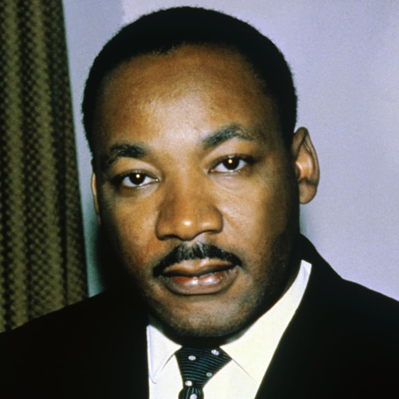
KING
Martin
The first president of the Southern Christian Leadership Conference (SCLC)
Organization: Southern Christian Leadership Conference (SCLC)
Date of Birth: 15 January 1929
person_view.holiday: Wikipedia Day
Date death: 4 April 1968
Age at the time of death: 39 years old
Zodiac sign: Capricorn
Profession: President
Biography
Martin Luther King Jr. was an American Baptist minister and activist who became the most visible spokesman and leader in the American civil rights movement from 1955 until his assassination in 1968. King advanced civil rights through nonviolence and civil disobedience, inspired by his Christian beliefs and the nonviolent activism of Mahatma Gandhi. He was the son of early civil rights activist and minister Martin Luther King Sr.
King participated in and led marches for blacks' right to vote, desegregation, labor rights, and other basic civil rights. King led the 1955 Montgomery bus boycott and later became the first president of the Southern Christian Leadership Conference (SCLC). As president of the SCLC, he led the unsuccessful Albany Movement in Albany, Georgia, and helped organize some of the nonviolent 1963 protests in Birmingham, Alabama. King helped organize the 1963 March on Washington, where he delivered his "I Have a Dream" speech on the steps of the Lincoln Memorial.
The SCLC put into practice the tactics of nonviolent protest with some success by strategically choosing the methods and places in which protests were carried out. There were several dramatic stand-offs with segregationist authorities, who sometimes turned violent. Federal Bureau of Investigation (FBI) Director J. Edgar Hoover considered King a radical and made him an object of the FBI's COINTELPRO from 1963, forward. FBI agents investigated him for possible communist ties, recorded his extramarital affairs and reported on them to government officials, and, in 1964, mailed King a threatening anonymous letter, which he interpreted as an attempt to make him commit suicide.
On October 14, 1964, King won the Nobel Peace Prize for combating racial inequality through nonviolent resistance. In 1965, he helped organize two of the three Selma to Montgomery marches. In his final years, he expanded his focus to include opposition towards poverty, capitalism, and the Vietnam War.
In 1968, King was planning a national occupation of Washington, D.C., to be called the Poor People's Campaign, when he was assassinated on April 4 in Memphis, Tennessee. His death was followed by riots in many U.S. cities. Allegations that James Earl Ray, the man convicted of killing King, had been framed or acted in concert with government agents persisted for decades after the shooting. King was posthumously awarded the Presidential Medal of Freedom in 1977 and the Congressional Gold Medal in 2003. Martin Luther King Jr. Day was established as a holiday in cities and states throughout the United States beginning in 1971; the holiday was enacted at the federal level by legislation signed by President Ronald Reagan in 1986. Hundreds of streets in the U.S. have been renamed in his honor, and the most populous county in Washington State was rededicated for him. The Martin Luther King Jr. Memorial on the National Mall in Washington, D.C., was dedicated in 2011.
Early life and education
King was born Michael King Jr. on January 15, 1929, in Atlanta, Georgia, the second of three children to Michael King and Alberta King (née Williams). King had an older sister, Christine King Farris, and a younger brother, Alfred Daniel "A.D." King. King's maternal grandfather Adam Daniel Williams, who was a minister in rural Georgia, moved to Atlanta in 1893, and became pastor of the Ebenezer Baptist Church in the following year. Williams was of African-Irish descent. Williams married Jennie Celeste Parks. King, Sr. was born to sharecroppers, James Albert and Delia King of Stockbridge, Georgia In his adolescent years, King Sr. left his parents' farm and walked to Atlanta where he attained a high school education, and enrolled in Morehouse College to study for entry to the ministry. King Sr. and Alberta began dating in 1920, and married on November 25, 1926. Until Jennie's death in 1941, they lived together on the second floor of her parent's two-story Victorian house, where King was born.
Shortly after marrying Alberta, King Sr. became assistant pastor of the Ebenezer church. Senior pastor Williams died in the spring of 1931 and that fall, King Sr. took the role, where he would in time raise the attendance from six hundred to several thousand. In 1934, the church sent King Sr. on a multinational trip to Rome, Tunisia, Egypt, Jerusalem, Bethlehem, then Berlin for the meeting of the Baptist World Alliance (BWA). The trip also included visits to sites in Germany associated with the Reformation leader, Martin Luther. While there, King Sr. witnessed the rise of Nazism. In reaction, the BWA conference issued a resolution that stated, "This Congress deplores and condemns as a violation of the law of God the Heavenly Father, all racial animosity, and every form of oppression or unfair discrimination toward the Jews, toward coloured people, or toward subject races in any part of the world." He returned home in August 1934, and at that time changed his name to Martin Luther King, and his son's to Martin Luther King Jr.
At his childhood home, King and his two siblings would read aloud the Bible as instructed by their father. After dinners there, King's grandmother Jennie, who he affectionately referred to as "Mama", would tell lively stories from the Bible to her grandchildren. King's father would regularly use whippings to discipline his children. At times, King Sr. would also have his children whip each other. King's father later remarked, " was the most peculiar child whenever you whipped him. He'd stand there, and the tears would run down, and he'd never cry." Once when King witnessed his brother A.D. emotionally upset his sister Christine, he took a telephone and knocked out A.D. with it. When he and his brother were playing at their home, A.D. slid from a banister and hit into their grandmother, Jennie, causing her to fall down unresponsive. King, believing her dead, blamed himself and attempted suicide by jumping from a second-story window. Upon hearing that his grandmother was alive, King rose and left the ground where he had fallen.
King became friends with a white boy whose father owned a business across the street from his family's home. In September 1935, when the boys were about six years old, they started school. King had to attend a school for black children, Younge Street Elementary School, while his close playmate went to a separate school for white children only. Soon afterwards, the parents of the white boy stopped allowing King to play with their son, stating to him "we are white, and you are colored". When King relayed the happenings to his parents, they had a long discussion with him about the history of slavery and racism in America. Upon learning of the hatred, violence and oppression that black people had faced in the U.S., King would later state that he was "determined to hate every white person". His parents instructed him that it was his Christian duty to love everyone.
King witnessed his father stand up against segregation and various forms of discrimination. Once, when stopped by a police officer who referred to King Sr. as "boy", King's father responded sharply that King was a boy but he was a man. When King's father took him into a shoe store in downtown Atlanta, the clerk told them they needed to sit in the back. King's father refused, stating "we'll either buy shoes sitting here or we won't buy any shoes at all", before taking King and leaving the store. He told King afterward, "I don't care how long I have to live with this system, I will never accept it." In 1936, King's father led hundreds of African Americans in a civil rights march to the city hall in Atlanta, to protest voting rights discrimination. King later remarked that King Sr. was "a real father" to him.
King memorized and sang hymns, and stated verses from the Bible, by the time he was five years old. Over the next year, he began to go to church events with his mother and sing hymns while she played piano. His favorite hymn to sing was "I Want to Be More and More Like Jesus"; he moved attendees with his singing. King later became a member of the junior choir in his church. King enjoyed opera, and played the piano. As he grew up, King garnered a large vocabulary from reading dictionaries and consistently used his expanding lexicon. He got into physical altercations with boys in his neighborhood, but oftentimes used his knowledge of words to stymie fights. King showed a lack of interest in grammar and spelling, a trait that he carried throughout his life. In 1939, King sang as a member of his church choir in slave costume, for the all-white audience at the Atlanta premiere of the film Gone with the Wind. In September 1940, at the age of 11, King was enrolled at the Atlanta University Laboratory School for the seventh grade. While there, King took violin and piano lessons, and showed keen interest in his history and English classes.
On May 18, 1941, when King had sneaked away from studying at home to watch a parade, King was informed that something had happened to his maternal grandmother. Upon returning home, he found out that she had suffered a heart attack and died while being transported to a hospital. He took the death very hard and believed that his deception of going to see the parade may have been responsible for God taking her. King jumped out of a second-story window at his home, but again survived an attempt to kill himself. His father instructed him in his bedroom that King should not blame himself for her death, and that she had been called home to God as part of God's plan that could not be changed. King struggled with this, and could not fully believe that his parents knew where his grandmother had gone. Shortly thereafter, King's father decided to move the family to a two-story brick home on a hill that overlooked downtown Atlanta.
Mentions in the news
Born in one day
person_view.holiday: Wikipedia Day
(Snake) .
Horoscope Capricorn: horoscope for today, horoscope for tomorrow, horoscope for week, horoscope for month, horoscope for year.
















































